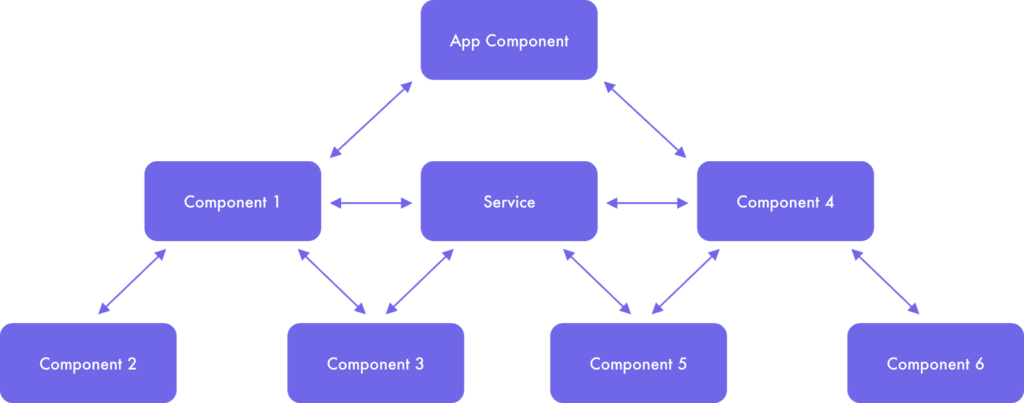Data Sharing in Angular Components

Parent to Child data sharing using input decorator
#Parent Component
import { Component } from '@angular/core';
@Component({
selector: 'app-parent',
template: `
<app-child [childMessage]="parentMessage"></app-child>
`,
styleUrls: ['./parent.component.css']
})
export class ParentComponent{
parentMessage = "message from parent"
constructor() { }
}
#Child Component
import { Component, Input } from '@angular/core';
@Component({
selector: 'app-child',
template: `
Say {{ message }}
`,
styleUrls: ['./child.component.css']
})
export class ChildComponent {
@Input() childMessage: string;
constructor() { }
}Child to Parent data sharing via ViewChild
#Parent Component
import { Component, ViewChild, AfterViewInit } from '@angular/core';
import { ChildComponent } from "../child/child.component";
@Component({
selector: 'app-parent',
template: `
Message: {{ message }}
<app-child></app-child>
`,
styleUrls: ['./parent.component.css']
})
export class ParentComponent implements AfterViewInit {
@ViewChild(ChildComponent) child;
constructor() { }
message:string;
ngAfterViewInit() {
this.message = this.child.message
}
}
#Child Component
import { Component} from '@angular/core';
@Component({
selector: 'app-child',
template: `
`,
styleUrls: ['./child.component.css']
})
export class ChildComponent {
message = 'Hello Child!';
constructor() { }
}
Child to Parent Sharing Data via Output() and EventEmitter
#Parent Component
import { Component } from '@angular/core';
@Component({
selector: 'app-parent',
template: `
Message: {{message}}
<app-child (messageEvent)="receiveMessage($event)"></app-child>
`,
styleUrls: ['./parent.component.css']
})
export class ParentComponent {
constructor() { }
message:string;
receiveMessage($event) {
this.message = $event
}
}
#Child Component
import { Component, Output, EventEmitter } from '@angular/core';
@Component({
selector: 'app-child',
template: `
<button (click)="sendMessage()">Send Message</button>
`,
styleUrls: ['./child.component.css']
})
export class ChildComponent {
message: string = "Hola Mundo!"
@Output() messageEvent = new EventEmitter<string>();
constructor() { }
sendMessage() {
this.messageEvent.emit(this.message)
}
}
Unrelated Components
Sharing Data with a Service
When passing data between components that lack a direct connection, such as siblings, grandchildren, etc, you should you a shared service.
When you have data that should aways been in sync, I find the RxJS BehaviorSubject very useful in this situation.
You can also use a regular RxJS Subject for sharing data via the service, but here’s why I prefer a BehaviorSubject.
It will always return the current value on subscription – there is no need to call onnext.
It has a getValue() function to extract the last value as raw data.
It ensures that the component always receives the most recent data.
In the service, we create a private BehaviorSubject that will hold the current value of the message.
We define a currentMessage variable to handle this data stream as an observable that will be used by the components.
Lastly, we create a function that calls next on the BehaviorSubject to change its value.
The parent, child, and sibling components all receive the same treatment. We inject the DataService in the constructor, then subscribe to the currentMessage observable and set its value equal to the message variable.
Now if we create a function in any one of these components that changes the value of the message.
When this function is executed the new data it’s automatically broadcast to all other components.
#data.service.ts
import { Injectable } from '@angular/core';
import { BehaviorSubject } from'rxjs';
@Injectable()
export class DataService {
private messageSource = new BehaviorSubject('default message');
currentMessage = this.messageSource.asObservable();
constructor() { }
changeMessage(message: string) {
this.messageSource.next(message);
}
}
#parent.component.ts
import { Component, OnInit } from '@angular/core';
import { DataService } from "../data.service";
@Component({
selector: 'app-parent',
template: `
{{message}}
`,
styleUrls: ['./sibling.component.css']
})
export class ParentComponent implements OnInit {
message:string;
constructor(private data: DataService) { }
ngOnInit() {
this.data.currentMessage.subscribe(message => this.message = message)
}
}
#sibling.component.ts
import { Component, OnInit } from '@angular/core';
import { DataService } from "../data.service";
@Component({
selector: 'app-sibling',
template: `
{{message}}
<button (click)="newMessage()">New Message</button>
`,
styleUrls: ['./sibling.component.css']
})
export class SiblingComponent implements OnInit {
message:string;
constructor(private data: DataService) { }
ngOnInit() {
this.data.currentMessage.subscribe(message => this.message = message)
}
newMessage() {
this.data.changeMessage("Hello from Sibling")
}
}For save data permanently in service
import { Injectable } from '@angular/core';
@Injectable({
providedIn: 'root',
})
export class UserService {
}
ProvidedIn and NgModules
It’s also possible to specify that a service should be provided in a particular @NgModule.
For example,
If you don’t want UserService to be available to applications unless they import a UserModule you’ve created, you can specify that the service should be provided in the module:
In this case, providedIn: ‘root’ specifies that Angular should provide the service in the root injector.
src/app/user.service.ts
import { Injectable } from '@angular/core';
import { UserModule } from './user.module';
@Injectable({
providedIn: UserModule,
})
export class UserService {
}The example above shows the preferred way to provide a service in a module.
This method is preferred because it enables tree-shaking of the service if nothing injects it.
If it’s not possible to specify in the service which module should provide it, you can also declare a provider for the service within the module
src/app/user.module.ts
import { NgModule } from '@angular/core';